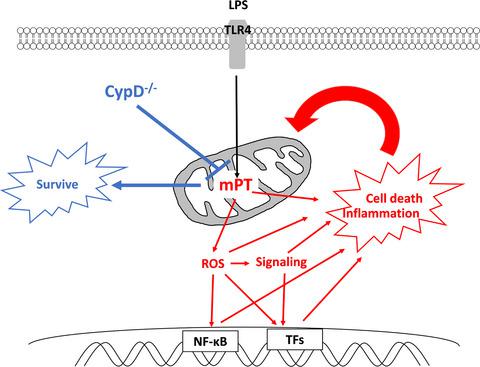当前位置:
X-MOL 学术
›
FEBS Open Bio
›
论文详情
Our official English website, www.x-mol.net, welcomes your
feedback! (Note: you will need to create a separate account there.)
Cyclophilin D‐dependent mitochondrial permeability transition amplifies inflammatory reprogramming in endotoxemia
FEBS Open Bio ( IF 2.8 ) Pub Date : 2021-01-20 , DOI: 10.1002/2211-5463.13091 Balazs Veres 1 , Krisztian Eros 1, 2, 3 , Csenge Antus 1 , Nikoletta Kalman 1 , Fruzsina Fonai 1 , Peter Balazs Jakus 1 , Eva Boros 4 , Zoltan Hegedus 1, 5 , Istvan Nagy 4, 6 , Laszlo Tretter 7 , Ferenc Gallyas 1, 2, 3 , Balazs Sumegi 1, 2, 3
FEBS Open Bio ( IF 2.8 ) Pub Date : 2021-01-20 , DOI: 10.1002/2211-5463.13091 Balazs Veres 1 , Krisztian Eros 1, 2, 3 , Csenge Antus 1 , Nikoletta Kalman 1 , Fruzsina Fonai 1 , Peter Balazs Jakus 1 , Eva Boros 4 , Zoltan Hegedus 1, 5 , Istvan Nagy 4, 6 , Laszlo Tretter 7 , Ferenc Gallyas 1, 2, 3 , Balazs Sumegi 1, 2, 3
Affiliation

|
Microorganisms or LPS (lipopolysaccharide), an outer membrane component of Gram‐negative bacteria, can induce a systemic inflammatory response that leads to sepsis, multiple organ dysfunction, and mortality. Here, we investigated the role of cyclophilin D (CypD)‐dependent mitochondrial permeability transition (mPT) in the immunosuppressive phase of LPS‐induced endotoxic shock. The liver plays an important role in immunity and organ dysfunction; therefore, we used liver RNA sequencing (RNA‐seq) data, Ingenuity® Pathway Analysis (IPA ®) to investigate the complex role of mPT formation in inflammatory reprogramming and disease progression. LPS induced significant changes in the expression of 2844 genes, affecting 179 pathways related to mitochondrial dysfunction, defective oxidative phosphorylation, nitric oxide (NO) and reactive oxygen species (ROS) accumulation, nuclear factor, erythroid 2 like 2 (Nrf2), Toll‐like receptors (TLRs), and tumor necrosis factor α receptor (TNFR)‐mediated processes in wild‐type mice. The disruption of CypD reduced LPS‐induced alterations in gene expression and pathways involving TNFRs and TLRs, in addition to improving survival and attenuating oxidative liver damage and the related NO‐ and ROS‐producing pathways. CypD deficiency diminished the suppressive effect of LPS on mitochondrial function, nuclear‐ and mitochondrial‐encoded genes, and mitochondrial DNA (mtDNA) quantity, which could be critical in improving survival. Our data propose that CypD‐dependent mPT is an amplifier in inflammatory reprogramming and promotes disease progression. The mortality in human sepsis and shock is associated with mitochondrial dysfunction. Prevention of mPT by CypD disruption reduces inflammatory reprogramming, mitochondrial dysfunction, and lethality; therefore, CypD can be a novel drug target in endotoxic shock and related inflammatory diseases.
中文翻译:

亲环蛋白 D 依赖性线粒体通透性转变放大内毒素血症中的炎症重编程
微生物或脂多糖(脂多糖)是革兰氏阴性细菌的外膜成分,可诱导全身炎症反应,导致败血症、多器官功能障碍和死亡。在这里,我们研究了亲环蛋白 D (CypD) 依赖性线粒体通透性转变 (mPT) 在 LPS 诱导的内毒素休克的免疫抑制阶段中的作用。肝脏在免疫和器官功能障碍中发挥着重要作用;因此,我们使用肝脏 RNA 测序 (RNA-seq) 数据、 Ingenuity®通路分析 ( IPA® ) 来研究 mPT 形成在炎症重编程和疾病进展中的复杂作用。 LPS 诱导 2844 个基因的表达发生显着变化,影响与线粒体功能障碍、氧化磷酸化缺陷、一氧化氮 (NO) 和活性氧 (ROS) 积累、核因子、红细胞 2 样 2 (Nrf2)、Toll‐ 相关的 179 条通路。样受体(TLR)和肿瘤坏死因子α受体(TNFR)介导的野生型小鼠过程。 CypD 的破坏减少了 LPS 诱导的基因表达以及涉及 TNFR 和 TLR 通路的改变,此外还可以提高生存率并减轻氧化性肝损伤以及相关的 NO 和 ROS 产生途径。 CypD 缺乏减弱了 LPS 对线粒体功能、核和线粒体编码基因以及线粒体 DNA (mtDNA) 数量的抑制作用,而这对于提高生存率至关重要。我们的数据表明 CypD 依赖性 mPT 是炎症重编程的放大器并促进疾病进展。人类败血症和休克的死亡率与线粒体功能障碍有关。 通过 CypD 破坏预防 mPT 可减少炎症重编程、线粒体功能障碍和致死率;因此,CypD可以成为内毒素休克和相关炎症性疾病的新药物靶点。
更新日期:2021-03-04
中文翻译:

亲环蛋白 D 依赖性线粒体通透性转变放大内毒素血症中的炎症重编程
微生物或脂多糖(脂多糖)是革兰氏阴性细菌的外膜成分,可诱导全身炎症反应,导致败血症、多器官功能障碍和死亡。在这里,我们研究了亲环蛋白 D (CypD) 依赖性线粒体通透性转变 (mPT) 在 LPS 诱导的内毒素休克的免疫抑制阶段中的作用。肝脏在免疫和器官功能障碍中发挥着重要作用;因此,我们使用肝脏 RNA 测序 (RNA-seq) 数据、 Ingenuity®通路分析 ( IPA® ) 来研究 mPT 形成在炎症重编程和疾病进展中的复杂作用。 LPS 诱导 2844 个基因的表达发生显着变化,影响与线粒体功能障碍、氧化磷酸化缺陷、一氧化氮 (NO) 和活性氧 (ROS) 积累、核因子、红细胞 2 样 2 (Nrf2)、Toll‐ 相关的 179 条通路。样受体(TLR)和肿瘤坏死因子α受体(TNFR)介导的野生型小鼠过程。 CypD 的破坏减少了 LPS 诱导的基因表达以及涉及 TNFR 和 TLR 通路的改变,此外还可以提高生存率并减轻氧化性肝损伤以及相关的 NO 和 ROS 产生途径。 CypD 缺乏减弱了 LPS 对线粒体功能、核和线粒体编码基因以及线粒体 DNA (mtDNA) 数量的抑制作用,而这对于提高生存率至关重要。我们的数据表明 CypD 依赖性 mPT 是炎症重编程的放大器并促进疾病进展。人类败血症和休克的死亡率与线粒体功能障碍有关。 通过 CypD 破坏预防 mPT 可减少炎症重编程、线粒体功能障碍和致死率;因此,CypD可以成为内毒素休克和相关炎症性疾病的新药物靶点。











































 京公网安备 11010802027423号
京公网安备 11010802027423号